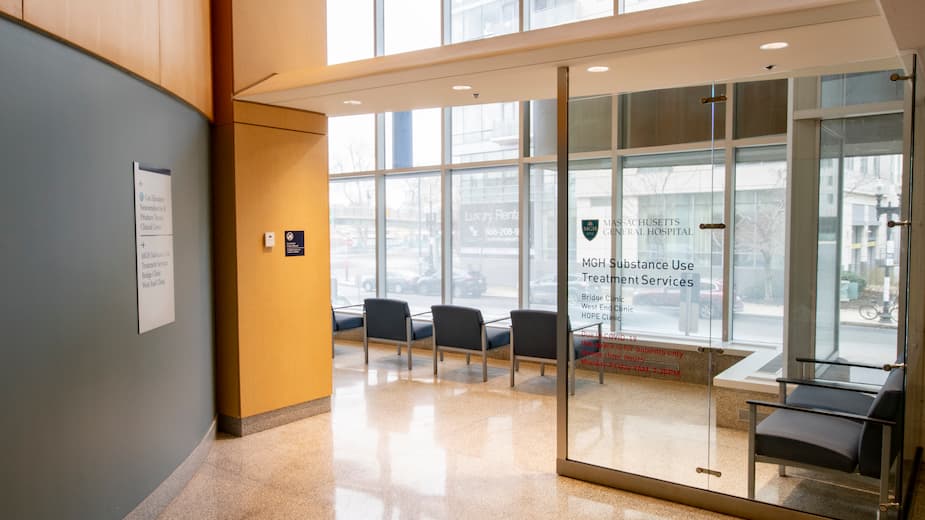Research Spotlight: Prescribing of Benzodiazepines in a Homeless Veteran Population
Short description of the study goes here. And be sure to update the link below to the new spotlight page you just created.
Weather AlertMass General Brigham's hospital campuses and off-site facilities are fully open and operational on Wednesday, Feb. 25, with the exception of some limited closures and delays. For real-time updates and service changes, please check our Alerts page.View Alerts page
Contact Information
55 Fruit Street
Cox Building, Suite 110
Boston,
MA
02114
Hours: Monday – Friday, 9am – 5pm
Main Office: 617-724-2480
Fax Number: 617-248-0070
Appointments at West End Clinic:
To be seen at our outpatient clinic, please contact our main office at 617-724-2480.
The West End Clinic is located on the main campus of Massachusetts General Hospital in Boston, Massachusetts. Patient parking is available on campus in one of garages onsite and there are also multiple Massachusetts Bay Transit Authority (MBTA) lines nearby, furthering its accessibility and making it easy to come to and go from your appointments.
If you or a family member is in crisis or facing an emergency, go to the nearest emergency room or call the SAMHSA National HelpLine at 1-800-662-HELP (4357).
The West End Clinic at Massachusetts General Hospital is an outpatient facility for those with substance use disorders and co-occurring mental health disorders.
The clinic offers a wide range of outpatient therapies, including:
The clinic also offers educational and treatment resources for people with substance use disorders. In addition to providing treatment and education, the West End Clinic helps patients and families navigate what can be burdensome insurance issues.
We work with each patient to determine the best course of treatment, and this multidisciplinary approach helps ensure our patients and their families receive the best care possible.
The West End Clinic offers a wide variety of treatment options for people with all types of substance use disorders and addictive behavior. We work with each patient to review your history, understand your current needs and make recommendations for the most appropriate treatment options.
The West End Clinic provides comprehensive evaluation of alcohol and other substance use disorders, including individualized treatment planning and referrals.
The West End Clinic also provides resources for hospital staff concerning issues of patient management, treatment, planning and resources, discharge planning, employee assistance and general information on substance use disorders. The West End Clinic maintains special clinical ties to other service areas, including Infectious Diseases and HIV, OB/GYN, Geriatric Medicine, Liver and Kidney Transplant and the Pain Management Center, due to the high rate of co-occurring medical issues and substance use disorders.
Our services include:
Note: Specialized treatment for young adults between 14-26 with substance use disorders is offered through the Addiction Recovery Management Service at Mass General.
The West End Clinic offers diverse modalities for group therapy and are held at the West End Clinic, located at Massachusetts General Hospital. See our group therapy listing to learn more about the groups we offer each week.
Any patient interested in enrolling in group therapy at the West End Clinic must have a Mass General primary care physician (PCP) or specialist and must complete a new patient evaluation prior to enrolling. For more questions, please contact the West End Clinic at 617-724-2480.
The Recovery & Relationship Enhancement Program invites family members or friends – generally called “supportive significant others” (SSO) - to actively participate in the treatment of their loved ones and enhance support for recovery through education and explorations of the impact of addiction and recovery on both patients and their families. Research has shown that SSO involvement can help improve treatment outcomes. Motivational interviewing strategies are used to explore patients’ thoughts about having SSO involvement and encourage them to join the program.
Once patients with substance use disorders undergo intake at the West End Clinic and actively pursue our services, they become eligible for this program.
Facilitated by: Estee Sharon, PsyD, Marc Bolduc, LICSW, Jennifer Blewett, DSW, LICSW, and Frank Dibert, PhD
There are two ways to access the program:
The COVID-19 pandemic highlighted the importance of human connection and the challenges of social isolation, especially for those on the path to recovery. While traditional peer support groups are valuable, our "Paired Recovery" program offers a unique, one-on-one connection. Your clinicians at the West End Clinic noticed a need to help patients feel less lonely and created this program to match you with another patient for mutual support. Based on factors like age, gender, social situation, and diagnoses, a clinician may suggest a potential match. Your privacy is our priority, and no identifying information is shared until both you and the other patient provide written consent. Once you both agree, a clinician will introduce you, allowing you to exchange contact information and begin your supportive relationship. Throughout this process, you will continue to see your individual clinician to discuss any issues that may arise.
Facilitated by: Iraklis Giakoumatos, MD, Vinod Rao, MD and Rachel Meyers-Weinerman
Vivitrol® is FDA approved for the treatment of alcohol use disorders and opioid use disorders. Naltrexone in intramuscular form (Vivitrol®) has been demonstrated to be effective in reducing alcohol consumption and assisting in sobriety. Patients who are able to abstain from alcohol (even for a short time) are appropriate for an injection of intramuscular naltrexone.
The West End Clinic oversees an injection clinic based in Cox 1 at Mass General where intramuscular naltrexone can be administered. We will assist in evaluating criteria for naltrexone as well as prior authorization related to the medication.
To be eligible, you must be in treatment at the West End Clinic (WEC). To become a patient, please call WEC at 617-724-2480 to make an appointment.
As part of your WEC assessment, we will discuss available treatment options for alcohol and other drug use disorders and make individual recommendations. A thorough review of your medical and psychological status will be coupled with an evaluation for appropriateness of pharmacotherapy. Our staff will collaborate with the injection clinic staff for patients who will benefit from this medication.
The staff at the injection clinic will assist with the insurance forms, ordering the medication, etc. Please note: You injection appointment will only be scheduled after the injection has been approved by your insurance.
Throughout the process, the WEC will update any referring providers.
Opioid-dependent patients who are in need and eligible for office-based opioid substitution therapy e.g. buprenorphine (Suboxone®) are admitted on a special track to the Intensive Outpatient Program (IOP).
After completing a first-time evaluation with the West End Clinic and a Suboxone® evaluation with a physician, eligible patients start the IOP and are seen by our Suboxone® providers for induction. During the week of their induction, these patients are seen three to four times in that week by an MD or RN. Suboxone patients continue receive all the other services provided to IOP patients.
Upon completing the IOP, Suboxone® patients are required to attend a Suboxone® Recovery Group that meets once a week (see days offered on the Group Therapy list) for a minimum of six months. After six months, patients are reassessed and considered for more individualized treatment.
The West End Clinic at Mass General provides multidisciplinary treatment for those with substance use disorders and co-occurring mental health conditions through a personalized approach within a national ranked hospital recognized for its excellence in patient care.
The West End Clinic is a comprehensive outpatient treatment center located on the main campus of Massachusetts General Hospital in Boston, Massachusetts for individuals seeking treatment with substance use disorders and co-occurring mental health conditions.
At the West End Clinic at Mass General patients have access to treatment for substance use disorders and co-occurring mental health conditions through our multidisciplinary treatment team.
The West End Clinic at Mass General uses a multidisciplinary treatment approach led by psychiatrists, nurse practitioners, clinical social workers, psychologists, and recovery coaches who are recognized leaders in the treatment of substance use disorders.
Our treatment services at the West End Clinic at Mass General include a wide range of specialized outpatient programing within an in-person and virtual hybrid setting.
The West End Clinic at Mass General offers a diverse range of outpatient modalities, including our Intensive Outpatient Program and extensive group therapies.
Our psychiatrists, nurses, social workers, and psychologists draw on years of experience and are focused on treating all substance use related disorders and co-occurring mental health disorders.
 Prajwal Acharya
Prajwal Acharya
Medical Assistant
Jeffrey Balewicz
Recovery Coach
 Jennifer Blewett, DSW, LICSW, DCSW, CGP
Jennifer Blewett, DSW, LICSW, DCSW, CGP
Clinical Social Worker
Assistant Director for Community Outreach and Engagement
 Marc G. Bolduc, LICSW, CADC II, CGP
Marc G. Bolduc, LICSW, CADC II, CGP
Clinical Social Worker
 Stephanie Butler, RN, PMHNP-BC
Stephanie Butler, RN, PMHNP-BC
Nurse Practitioner
 Lisa Du Breuil, LICSW
Lisa Du Breuil, LICSW
Clinical Social Worker
 Frank Dibert, PhD
Frank Dibert, PhD
Clinical Psychologist David Eddie, PhD
David Eddie, PhD
Clinical Psychologist
 Adolfo Flores Fortty, MD
Adolfo Flores Fortty, MD
Psychiatrist
 Christoforos Iraklis Giakoumatos, MD
Christoforos Iraklis Giakoumatos, MD
Psychiatrist
 Allison Labbe, PhD
Allison Labbe, PhD
Clinical Psychologist
 Toby Lynch, PhD
Toby Lynch, PhD
Clinical Psychologist
Assistant Director for Psychotherapy Innovations
 Meredith Morrison, RN, PMHNP-BC
Meredith Morrison, RN, PMHNP-BC
Nurse Practitioner
 Helen Ni, LICSW
Helen Ni, LICSW
Clinical Social Worker
Clinical Care Coordinator
 Estee Sharon, PsyD
Estee Sharon, PsyD
Clinical Psychologist
 Rachel Steere, DO
Rachel Steere, DO
Psychiatrist
 Tahir Tellioglu, MD
Tahir Tellioglu, MD
Psychiatrist
 Alicia Ventresca, PsyD
Alicia Ventresca, PsyD
Clinical Psychologist
 Rachel Meyers-Weinerman
Rachel Meyers-Weinerman
Patient Service Coordinator
 Mayra Zelaya
Mayra Zelaya
Practice Manager
In addition to providing exemplary therapeutic care to patients, the West End Clinic is dedicated to assisting Mass General trainees, including fellows, residents, medical students, psychology and social work interns and staff clinicians, who are interested in facilitating groups and would like to enhance their knowledge and therapeutic skill.
To support these goals, a peer supervision group has been organized. Within this group, each participating clinician is viewed as an essential element of a “group-as-a-whole” directed toward the understanding of group dynamics and processes. The emphasis is on the presentation of actual clinical material. Group members have the opportunity to comment on the emerging group process and to provide support for the presenting clinician who may be struggling with particular challenges or concerns. Another focus is on addressing all formal aspects of group psychotherapy, including the identification of a clinical need, linking to referral resources, accessing appropriate patient populations, legal and ethical concerns, and the assessment of group process and outcome. Effectively communicating with others involved in the patient's care and monitoring the patient’s overall progress is an overarching priority.
The peer supervision group also offers the following opportunities:
Meeting ID: 310 146 047
Dial in phone numbers: (929)436-2866, (669)900-6833
Tuesday Online Meeting at 5:30pm: https://smartrecovery.zoom.us/j/8375777628#success
Thursday Online Meeting at 5:30pm: https://smartrecovery.zoom.us/j/8375777628#success
1. The Brien Center (CBHC)
334 Fenn St, Pittsfield, MA 01201
Phone: (800) 252-0227
2. Clinical Support Options CBHC - Greenfield
1 Arch Place, Greenfield, MA 01301
Phone: (800) 562-0112
3. Clinical Support Options CBHC - Northampton
8 Atwood Dr, Northampton, MA 01060
Phone: (800) 562-0112
4. Gateway Community Behavioral Health Center (CBHC)
1109 Granby Rd, Chicopee, MA 01020
Phone: (833) 243-8255
5. Behavioral Health Network WellBeing Center (CBHC) - Springfield
417 Liberty St, Springfield, MA 01104
Phone: (800) 437-5922
6. Behavioral Health Network WellBeing Center (CBHC) - Westfield
77 Mill Street, Westfield, MA 01085
Phone: (800) 437-5922
7. Clinical Support Options CBHC - Athol
2033 Main St, Athol, MA 01331
Phone: (800) 562-0112
8. Clinical Support Options CBHC - Gardner
205 School St, Gardner, MA 01440
Phone: (800) 562-0112
9. Community HealthLink CBHC - Leominster
40 Spruce St, Leominster, MA 01453
Phone: (800) 977-5555
10. Community HealthLink CBHC - Worcester
12 Queen St, Worcester, MA 01610
Phone: (866) 549-2142
11. Riverside Community Care (CBHC) - Milford
176 West St, Milford, MA 01757
Phone: (800) 294-4665
12. Advocates CBHC - Framingham
1094 Worcester Road, Framingham, MA 01702
Phone: (800) 640-5432
13. Vinfen Community Behavioral Health Center (CBHC)
40 Church St, Lowell, MA 01852
Phone: (866) 388-2242
14. Beth Israel Lahey Health Behavioral Services (CBHC)
12 Methuen St, Lawrence, MA 01840
Phone: (877) 255-1261
15. Eliot Community Human Services (CBHC) - Danvers
10 Harbor St, Danvers, MA 01923
Phone: (866) 523-1216
16. Advocates CBHC - Waltham
675 Main Street, Waltham, MA 02452
Phone: (800) 640-5432
17. Riverside Community Care (CBHC) - Norwood
190 Lenox St, Norwood, MA 02062
Phone: (800) 529-5077
18. Child and Family Services CBHC - Fall River
160 Osborn St, Fall River, MA 02724
Phone: (508) 676-5708
19. Child and Family Services CBHC - New Bedford
1061 Pleasant St, New Bedford, MA 02740
Phone: (877) 996-3154
20. Bay Cove Behavioral Health and Wellness Center (CBHC)
116 Camp St, Hyannis, MA 02601
Phone: (833) 229-2683
21. Fairwinds Center (CBHC)
20 Vesper Ln, Nantucket, MA 02554
Phone: (888) 323-3447
22. Community Counseling of Bristol County (CBHC)
1 Washington St, Taunton, MA 02780
Phone: (800) 660-4300
23. Child and Family Services CBHC - Plymouth
68 Industrial Park Rd, Plymouth, MA 02360
Phone: (877) 996-3154
24. High Point Treatment Center CBHC
30 Meadowbrook Dr, Brockton, MA 02301
Phone: (888) 725-9066
25. Aspire CBHC
460 Quincy Ave, Quincy, MA 02169
Phone: (800) 528-4890
26. Boston Medical Center CBHC
85 E Newton St, Boston, MA 02118
Phone: (800) 981-4357
27. North Suffolk Community Services (CBHC)
14 Porter St, East Boston, MA 02128
Phone: (888) 309-1989
28. Cambridge Health Alliance CBHC
1493 Cambridge St, Cambridge, MA 02139
Phone: (833) 222-2030
29. Eliot Community Human Services (CBHC) - Lynn
95 Pleasant St, Lynn, MA 01901
Phone: (800) 988-1111
30. Eliot Community Human Services (CBHC) - Danvers
10 Harbor St, Danvers, MA 01923
Phone: (866) 523-1216
RecoveryWorks is a program at Massachusetts General Hospital that helps individuals in addiction recovery thrive by providing career guidance and supporting personal growth to pursue and sustain meaningful employment. RecoveryWorks provides mentorship, career coaching, recovery- and career-oriented skills training groups, and assistance with overcoming barriers to re-entering the workforce. Our program is virtual and is offered for up to five years assuring continuity and longevity of support and facilitating accessibility nationwide, from urban to rural regions.
RecoveryWorks highlights the notion that while recovery enhances employment prospects, employment and retention in the workplace bolsters the recovery journey just as well. We are developing an evidence-based model to challenge addiction stigma and exclusion and to promote social inclusion, purpose and hope, good citizenship, the right to be a contributing and respected member of society, and the reciprocal recognition among employers about the value people in recovery bring to the workplace.
RecoveryWorks accepts referrals from across the nation.
If you have any inquiries, please send us an email.
For 80 years, Mass General's Psychiatry Department has provided the highest quality patient care through pioneering research.
Resources for patients and families including educational programs and information about mental health issues from the Department of Psychiatry.
U.S. News & World Report rates Mass General Psychiatry the top in the nation.
For 80 years we've provided the highest quality patient care, conducted pioneering research and educated professionals in the field.
Short description of the study goes here. And be sure to update the link below to the new spotlight page you just created.
We challenged Dr. Gilman to break down the title of her recent research paper, Identification of ∆9-tetrahydrocannabinol (THC) impairment using functional brain imaging.
Get information about the importance of screening for depression and talking to your primary care provider (PCP) if you think you might be suffering from depression.
Get information about naloxone (brand name Narcan) now being available over the counter and resources for opioid substance use disorder from Vinod Rao, MD, PhD, psychiatrist at Mass General.
Jagpreet Chhatwal, PhD, is the lead author of a paper in JAMA Network Open, Estimated Reductions in Opioid Overdose Deaths with Sustainment of Public Health Interventions in Four US States.
A Massachusetts General Hospital research team studies the impact of regulations on pregnant and postpartum individuals with opioid use disorder (OUD). Their findings were recently published in the Maternal and Child Health Journal.
The integration of patient care and clinical research has been a hallmark of the Department of Psychiatry for more than 30 years. Today, the department has the largest clinical research program in the hospital, with studies at the forefront of neuroscience, molecular biology and genetics.

